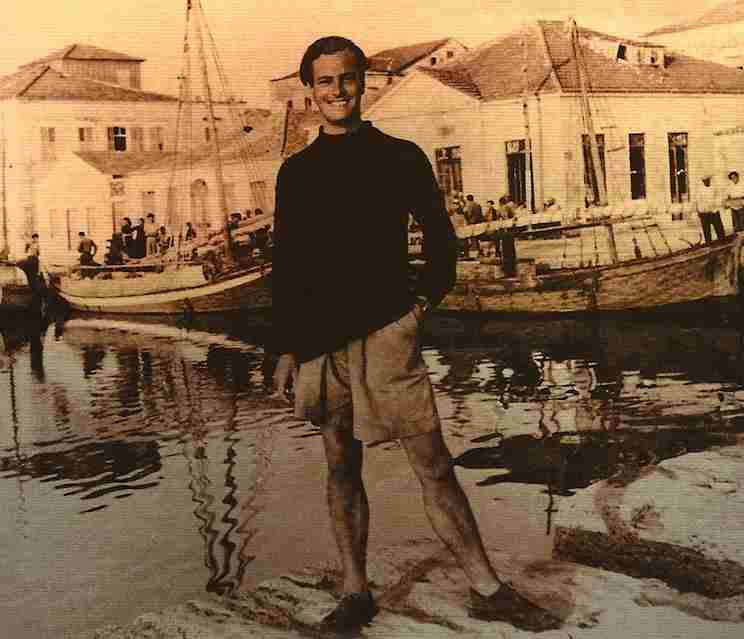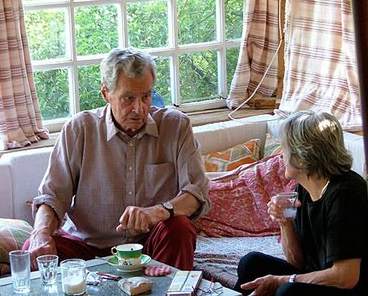|
|
footloose and free
PATRICK LEIGH FERMOR

by
JOHN M. EDWARDS
_____________________________________
John M. Edwards middlenamed his daughter after his favourite
travel writer, Bruce Chatwin. His work has appeared in Amazon.com,
CNN Traveller, Missouri Review, Salon.com, Grand Tour, Michigan
Quarterly Review, Escape, Global Travel Review, Condé
Nast Traveler, International Living, Emerging Markets
and Entertainment Weekly.
“Soon
the delightful cry of ‘Delphinia’ went up: a school
of dolphins was gambolling about half a mile further out to sea.
They seemed to have spotted us at the same moment, for in a second
half a dozen of them were tearing their way toward us, all surfacing
in the same parabola and plunging together as if they were in
some invisible harness.” Patrick Leigh Fermor (Mani).
Patrick Leigh Fermor,
“Paddy” to his pals, is now a not-so-neglected name
to reckon with. Knighted in 2004, Sir Patrick Michael Leigh
Fermor (1915-2011) is considered by many, despite  the
Irish-sounding surname, to be England’s greatest travel
writer. Or as the BBC put it, a cross between “Indiana
Jones, James Bond, and Graham Greene.” the
Irish-sounding surname, to be England’s greatest travel
writer. Or as the BBC put it, a cross between “Indiana
Jones, James Bond, and Graham Greene.”
Even
so, Paddy -- author, scholar, soldier, spy -- gained lasting
literary acclaim only late in his life. He wrote about events
long past without the help of his lost journals (one of them
was recovered years later from a former mistress), ending up
writing with an intriguing mix of memory and imagination. His
nonfiction books are so well written, we feel like we have lived
through them ourselves.
Ordering
on Amazon, I dropped all of Paddy’s books in my shopping
cart and sped through checkout, ready to eye his entire oeuvre
exclusively for The Smart Set. As someone who actually believes
in the pagan gods of classical antiquity, as fallible as mere
mortals -- and a big fan of Henry Miller’s The Colossus
of Maroussi to boot -- I wanted to steep myself in Paddy’s
technicolour world of Mediterranean maenads lost in siren song
straight out of a Ray Harryhausen flick.
Best
known for his classic trilogy about his bildungsroman voyage
by foot across Europe -- A Time of Gifts (1977), Between
the Woods and the Water (1986), and The Broken Road
(2013), the last of which was published posthumously -- -Paddy
wrote about a “dream odyssey of every footloose student,”
according to his friendly rival Colin Thubron.
In
1933, Paddy, at the age of 18, set out to walk from the Hook
of Holland to Constantinople (the Philhellene’s term for
modern-day Istanbul, Turkey). A recent biography worth reading,
Patrick Leigh Fermor: An Adventure, by Artemis Cooper,
brings out the romantic tradition of the ‘vagabond’
in all of us, with colourful operatic characters, priceless
cultural artifacts, and vaguely improbable landscapes. Luckily,
Paddy waited over thirty years to release his finest narrative
work, sifted through mercurial memory and addended by artistic
license, rather than settling upon slapdash diary.
Home
for Fermor, as he has said more than twice, is “a base
to be nomadic from,” while he keeps company with tramps
and vagabonds, peasants and gypsies, and sleeps in uncomfortable
hayricks and baronial manors. We can almost visualize Paddy
right there in the thick of it, through the bohemian hobo haze
of Looney Toons-ish cartoon bums, usually sporting handkerchiefs
impishly tied to walking sticks.
Born
in London and died in Dembleton, Paddy ended up a decorated
war hero and pub raconteur. Farmed out to friends while his
parents were away in Raj-ruled India, Paddy did not properly
get to know his parents until the age of four. No surprise,
Paddy had a troubled youth, managing to get himself put into
a school for difficult children, before later being expelled
from the King’s School in Canterbury for holding hands
with a greengrocer’s daughter.
Paddy
describes his young self thus: “A cruel Fauntleroy veneer
masked a Charles Addams fiend that lurked beneath.”
His
only real ambition was to dance the Charleston at Roaring Twenties
Jazz Age parties and become a famous writer, which in 1933 took
him to boho Shepherd’s Market in London, and soon after
to the Balkans and Greece. What Colin Thubron called “the
longest gap year in history.”
To
retrace our trail a little bit, Paddy ranks right up there with
Paul Theroux, Erik Newby, and Norman Lewis. One of the so-called
Bright Young Things (which included Evelyn Waugh and Robert
Byron), Fermor’s fermented writings evidence fruit-forward
diction with a noble-rot nose on it, uncorked way past their
expiration dates.
No
other travel writer I can think of so effortlessly relies on
hindsight, such as the following excerpt from A Time of
Gifts at a “hoggish catalepsy” in the famous
Haufbrauhaus in Munich, Germany, right after Hitler came to
power in Deutschland in 1933:
I
was back in beer territory. Halfway up the vaulted stairs a
groaning Brownshirt, propped against the wall on a swastika’d
arm, was unloosing, in a staunchless gush down the steps, the
intake of hours. Love’s labour lost . . . Hands like bundles
of sausages flew nimbly, packing in forkload on forkload of
ham, salami, frankfurters, krenwurst and bludwurst and stone
tankards were lifted for long swallows of liquid which sprang
out again instantaneously on cheek and brow . . . It was some
terrible German saga, where snow vanished under the breath of
dragons whose red-hot blood thawed sword blades like icicles
. . . Or so it seemed, when the third mug arrived.
Paddy
offers an exceptional argument in favour of the vagabond life,
reminiscent of the tramps in Depression Era America and the
swells in Grand Tour Europe, sleeping in abandoned barns and
shepherds’ huts, as well as being invited into the landed-gentry
country homes of Central European aristocracy, such as Baron
Blah Blah Blah, serving up roast goose and decent claret. (I’ll
name just one of his myriad royal hosts with long unpronounceable
names: Baron Tibor Solymosy).
More
important, Paddy might be the very first genuine postmodern
backpacker, since he travels only with what he can carry in
a sturdy rucksack: clothes, letters of introduction, an Oxford
Book of English Verse, and a copy of Horace’s Odes.
Heavily influenced by Lord Byron, who died fighting in the Greek
War for Independence, and Robert Byron, who drowned in 1941
like Shelley from a torpedo blast, Paddy too had a Hellenic
obsession. He even reportedly swam across the Hellespont. Referring
to his Olympian Buster Crabbe-like feat he was confident that
he “had beaten all records for slowness and length of
immersion.”
After
at last arriving in Constantinople (now Istanbul since the eclipse
of Ottoman power)) in 1935, Paddy moved on to amazing Greece,
where he fell for his first love in Athens: a “Phanariot
Roumanian noblewoman named Princess Balasha Cantacuzene. They
set up shop in what would end up being Paddy’s second
home: Kardamyli on southern Greece’s Mani peninsula. They
then moved to Moldova right before calamity struck and ended
up being separated by jagged-jigsaw-puzzle-pieces of nation
states swept up in the worldwide conflagration.
During
World War II, as a newbie in the elite Irish Guards, Paddy was
involved in the Mission Impossible-y resistance in Crete against
the Axis powers. There, disguised in a sheepskin jerkin, he
helped with the war effort. Most famously, after three tours
in occupied Greece, one including a dramatic parachute jump,
in 1944 he kidnapped the German General Heinrich Kreipe.
Although
nothing quite beats the lyrical A Time of Gifts, all
of Paddy’s mostly successful work deserves mention. His
first book, The Traveller’s Tree (1950), is still
one of the best books ever written about the Caribbean. It won
the Heinemann Foundation Prize for Literature and was excessively
quoted by Ian Fleming in Live and Let Die. It was also,
despite its antique handling of racial issues, one of the first
books to mention the then-almost-unknown cult of Rastafarianism.
Judging by the book’s unique tone, Paddy was no stranger
to smoking the ganja, too.
His
next book, a vaguely disappointing first novel called The
Violins of Saint-Jacques (1956) is difficult to track down
either on the megastore bookshelf or the omniscient web. Almost
optioned as a film, the book went on to inspire an opera.
Ultimately
avoiding failure in the nick of time, Paddy married Joan Elizabeth
Rayner in 1968 (unfortunately right during the Sexual Revolution),
daughter of a noble family. Even though she died in June 2003,
aged 91, leaving the scholar-author-soldier decidedly bitter,
Paddy, under her influence, pulled off of his proverbial wagon
and released what is surely his best works, including the legendary
classic – alluded to ad nauseum -- A Time
of Gifts.
Obviously
influenced by Byron (Robert, not Lord), whose Athos
(1924) capitalized on the craze of Anglo classicist Philhellenes,
Paddy’s two books on amazing Greece, Mani: Travels
in the Southern Peloponnese (1958) and Roumeli: Travels
in Northern Greece (1966), are so exquisitely versed, even
though way over our heads linguistically, with colorful Greek
sur and place names and translations of poetically iconic terms,
that we all fall under an olive-grove trance. It is not what
is written that is important, but instead how.
A
fashion-conscious blade, Paddy, in Roumeli, commented
upon the rumour that the outlandishly dressed, ceremonial-dagger-wielding
shepherd nomads Savakatsans (Black Departers) of Northern Greece
never bathe from birth to death: “Oddly, they scarcely
smell at all, perhaps because of the time-stiffening carapace
of cloth which encases them.”
Although
separated by nearly a decade, the two Greek books make excellent
companions for the guest-room night table, dazzling us with
unfamiliar terms and hard-to-pronounce locations. (Paddy, although
occasionally supplying translations, seems to assume his learned
readership has studied at least some Greek). Amidst a backdrop
of hilltop Byzantine monasteries, hagiographic frescos of saints
and martyrs, and illuminated manuscripts, Paddy involves us
in his wayward philosophic peregrinations.
For
example, from Mani, in Missolonghi, Paddy goes looking
for Byron’s slippers; in Astakos (lobster in Greek), which
he doesn’t find, and on the Mani peninsula, he investigates
an ouzo-swilling Zorba the Greek fisherman claiming to be the
rightful heir to the throne of Byzantium, as well as unsubstantiated
rumours of a race of ancient Jews.
Rather
than relying on his lost diaries, whose absence “aches
like an old wound in cold weather,” he sifts his stories
into meme memoir, and then some. In Between the Woods and
the Water, for example, Paddy describes a chance meeting
in Bulgaria inside “an abode harmoniously shared by Polythemus
[the Cyclops from Homer’s The Odyssey] and Sinbad.”
Paddy relates in seductive (no: shimmering) prose:
I crawled the path and I pulled open an improvised door, uttering
a last dobar vecher [good evening] into the memorable cavern
beyond. A dozen firelit faces looked up in surprise and consternation
from the cross-legged supper, as though a sea monster or a drowned
man’s ghost had come . . .
While
re-reading Paddy’s essay collection Words of Mercury
(2003) in Knossos, Crete, at an al fresco taverna with excellent
retsina and grilled squid resembling asterixes, near the Temple
of Minos (of Minotaur fame), I became enthralled with his twice-told
tales of derring-do. It was here in 1944 that Paddy organized
the resistance against the Axis powers and kidnapped the German
General Heinrich Kreipe, with whom, after the war, he became
friends: both of them were, after all, fans of Horace. I felt
like I was frigging right there with the unfamiliar chthonic
Greek language spewing out of unemployed Golden Dawn peasants
mouths like black ink cartridges on an HP printer.
A
film version of Paddy’s wartime exploits in Greece called
Ill Met by Moonlight (1950), featured Dirk Bogarde as Paddy.
A recipient of both the OBE (Order of the British Empire) and
a DSO (Distinguished Service Order), Paddy was also an Honourary
citizen of Crete, where he was nicknamed, for no apparent good
reason, Michalis.
But
it is the spirit of the journey that counts. Paddy, dressed
in a sheepskin jerkin, “sleeps rough,” in barns
and monasteries, inns and hostels, caves and sheepfolds, and
people’s couches and under the stars. Often grubbing at
monasteries for silence and solitude, in order to write, Paddy
covers in his ode to unemployment what it is like to be young
and free abroad, much like the vagabonding ethic now propounded
by Rolf Potts. In the slender volume A Time to Keep Silence
(1957), Paddy relates how he sponges off monasteries, such as
the Benedictine Monastery at Saint Wandrille in Normandy, in
order to make sense of his world.
Rereading
Paddy’s impressive oeuvre of pulchritudinous prose and
Klephtic songs in an Oriental register, a roundup worthy of
repeating, abounding with footloose barons and beggars straight
out of a game of Six Degrees of Kevin Bacon, you will never
take your own two legs for granted ever again.
His
vanished Europe is a Grimm’s fairytale of an outcast depending
upon the kindness of strangers, a stroll from one Schloss to
another. Whether he is describing the pine-clad Carpathians
or glorious Black Sea, Eastern Orthodox monasteries or Byzantine
Empire onion domes, Paddy pads his text with the “rumour
of wolves” (or, werewolves) and the legacy of Germanic
Transylvanian Prince Dracula (or, Vlad Tepes [Vlad the Impaler]).
Paddy proves that even the best-laid plans may run off course,
like a colourful gypsy caravan from Universal Pictures. Especially
due to lack of funds.
In
Vienna, missing a monthly allowance payment of four pounds sterling
in the poste restante while staying in a Salvation Army Hostel
(much like a modern-day YHA joint), he is convinced by a fellow
flaneur named Konrad to sell sketches door to door.
Which is a better gig than Import-Export -- an international
euphemism for chronic unemployment.
Artemis
Cooper, Fermor’s biographer, says Paddy “smudged
the facts a little.” Much like his close friend Bruce
Chatwin, if not Lawrence Durrell, Paddy admitted that occasionally
he ad libs, such as a highly dubious account of riding through
the Hungarian puzhta by horseback. Response? Paddy “felt
the reader might be getting bored of me, just plodding along
. . . “ More than once, writes Cooper, Paddy’s “magpie
mind” adds details freely.
 Until
2007, Paddy wrote all of his books in longhand, only reluctantly
turning to a typewriter in hopes of finishing his magnum opus
on vagabonding through pre-war Europe right before the mappa
mundi burst into flame. Until
2007, Paddy wrote all of his books in longhand, only reluctantly
turning to a typewriter in hopes of finishing his magnum opus
on vagabonding through pre-war Europe right before the mappa
mundi burst into flame.
A
five-pack-a-day smoker, whose photos frequently feature him
stylishly holding a dangling cigarette like Rod Serling narrating
The Twilight Zone, Paddy was nevertheless physically fit. Splitting
his time between the Mani peninsula in Greece and Worcestorshire,
England, his last request was to be returned to his native soil.
He died in 2011, aged 96, only one day after his return, the
dearly departed spy in him as spry and sly as ever.
also by John M. Edwards:
Slovenly
Slowdown in Slovakia
Poland:
Potent Potables
Confessions
of a Tasmaniac
The
Bulgarian Way
Sumatra's
Hex & Sex
Kutna
Hora and the Chapel of Bones
Remembering
Bruce Chatwin
Coffe
Art of Sol Bolaños
|
|
|